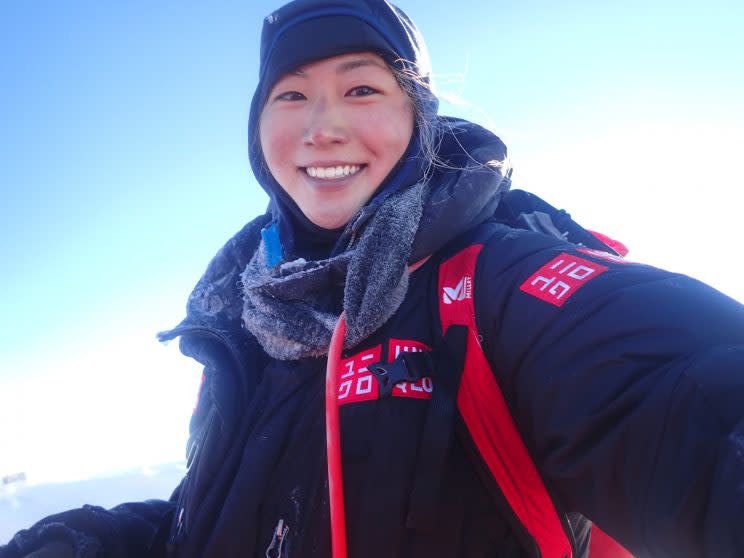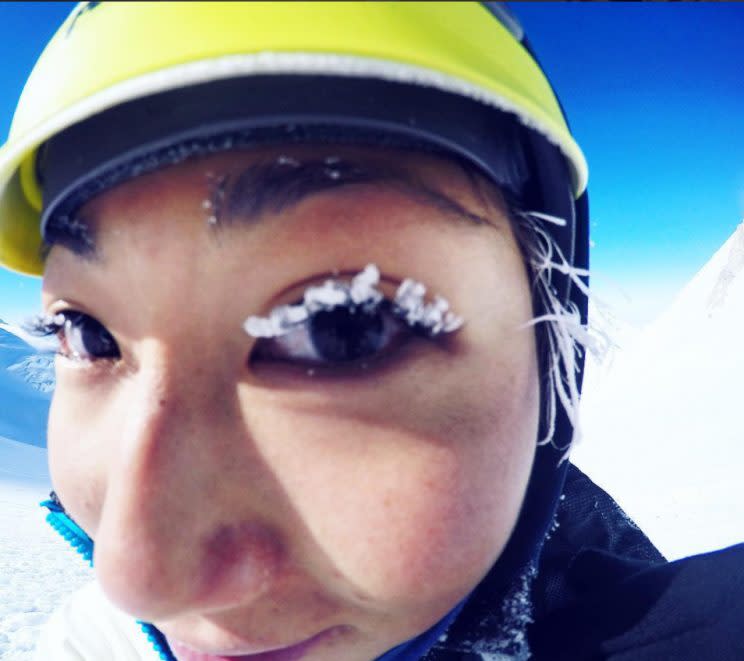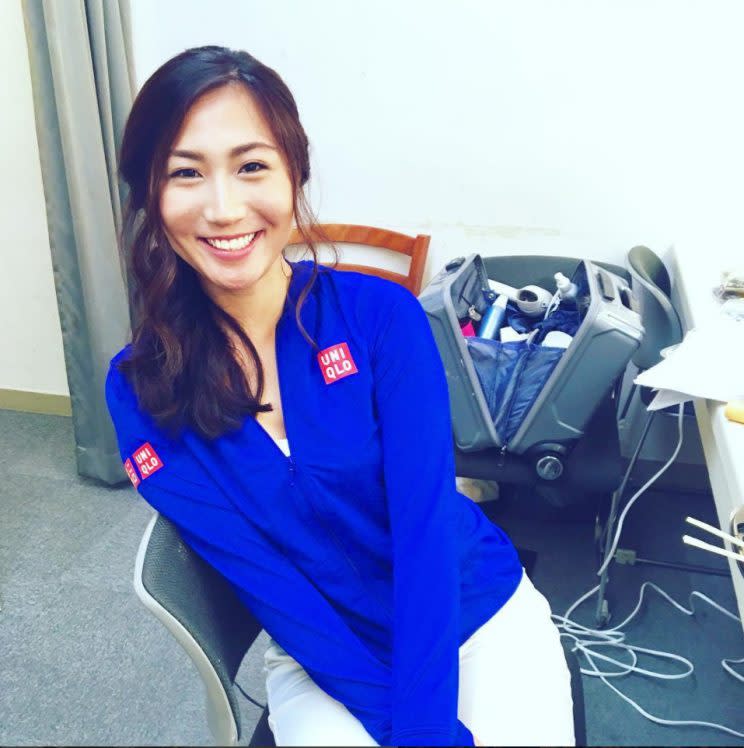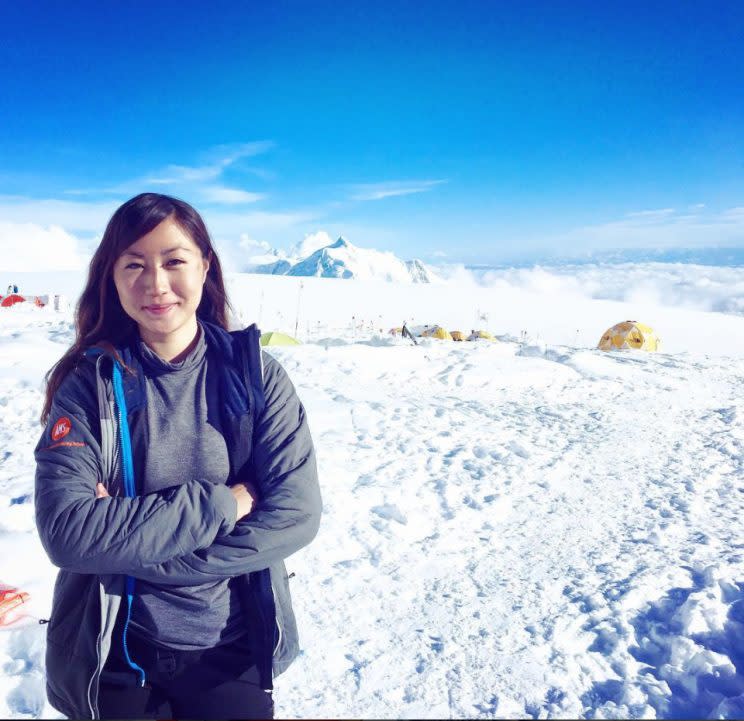Meet Marin Minamiya, the Youngest Japanese Person to Climb Everest

In May 2016, Marin Minamiya became the youngest Japanese person to scale Mount Everest, at the tender age of 19. What’s more, she performed that feat decked out in Uniqlo LifeWear gear (as her victory selfie demonstrates). Now, Marin is a Uniqlo ambassador, and working with the company to develop even more heat-retaining items with the help of her unusual expertise. We spoke with Minamiya about the technical performance of Uniqlo, the difficulty (to understate the case) of climbing Mount Everest, and even the criticism she gets for not being young enough.
Yahoo Style: Tell me how this collaboration began in the first place. You reached out to Uniqlo first, right?
Marin Minamiya: Yes, I contacted Uniqlo because I was wearing Uniqlo’s clothes, and I was looking for a sports sponsor on my climbing journeys and actually asked Uniqlo to provide me with clothes. Recently, actually, Uniqlo became my sponsor, and I was able to be their ambassador.
How did you come to discover that Uniqlo would be the very best clothes for you to wear on your journey? I’m sure you tested so many different options.
Yes, I was 17 years old back then, and I didn’t have enough pocket money to go out and buy really expensive mountain gear! I’d been climbing with Uniqlo clothes because it was so affordable, and the technology used in their clothes [was] fantastic. I thought, “OK, then. Why don’t I contact this really humble company?”

As you were preparing for your journey, what was the most important thing that you discovered about Uniqlo’s clothing?
Uniqlo actually customized some of my clothes. For example, [for] my Everest down suit, they were able to recreate technical performance that was better than other mountaineering companies’. That was actually surprising: The fact that Uniqlo’s clothes are suited even to the most extreme conditions and, yes, their clothes still function just as well in daily life.
What is your favorite piece in the current Uniqlo collection?
Since it’s winter right now, and in Japan it’s very cold, I like wearing Ultra Warm Heattech. I don’t know if you know this, but there are three types of Heattech. There’s normal, Extra Warm Heattech, and then Ultra Warm Heattech, which is brand new, and I love it. I can’t live without it. I wear one Ultra Warm Heattech and put on a jacket, and I’m ready to go to school or to work out.
I’m surprised they could even do better than regular Heattech! How does it work? (If you don’t mind getting slightly technical.)
The fibers are extremely thin, and several of them get woven into one thread. Everything is so microscopic that when you wear it, it creates this air socket. I am not a technical person, so I don’t know exactly how it works, but when you sweat, it creates heat, actually.

On your Everest journey, what would you say was the most challenging part of going on the expedition?
Well, on the Everest expedition, I was the only girl on the team, and there were actually very few Asian people, though that wasn’t the most challenging part. For me, the most challenging part would be that I felt completely alone. I think this is what makes me different and special from other young climbers. Jordan Romero, I think he was the youngest person to climb the seven summits, but he had his father with him, and his father actually helped him gather the sponsorship and raise money. I think that being under 20 years old, I was the only person without parental support [who got] sponsorship.
I also think it’s different because most Asian families have different expectations for their children, and those have nothing to do with climbing mountains or going on any kind of adventures. Breaking that standard was a big deal for me.
How did the idea get implanted in you in the first place? If it’s not part of your upbringing, part of your culture, how do you even know that that’s a possibility for you?
The fact that people around me told me that I couldn’t do it made me believe that I can do it. I know it sounds weird, but the more people told me that “There’s no way you can do it,” it made me feel like, “OK, I have to prove them wrong.”
Was there anybody who inspired you in your life? Somebody you knew or somebody you didn’t know who put the idea in your head?
Many, many people did, but I could say my father. Unlike many Asian fathers, he let me think freely and do what I really wanted. He also encouraged me to be independent in my thoughts, opinions, and ideas.
Is he a climber himself?
No, he has never climbed before. Neither has my mom.

Who would mentor you while you were doing this?
Other climbing friends. Have you heard of the UNI climbers? In Japan, there are other climbers that wear Uniqlo because it is so affordable and because Uniqlo is such a humble company. Collectively, they’re called the UNI climbers. Many of these climbers who shared the same vision helped me get the mountaineering skills and trained me, physically and emotionally, to complete this challenge.
What makes you continue to work with Uniqlo? I’m sure other companies like North Face or Patagonia would love to sponsor you.
Sure. Those brands create clothes specifically for outdoors. Uniqlo, on the other hand, doesn’t.
Yet, Uniqlo’s clothes can endure outdoor, extreme conditions, which I find very attractive. It’s especially fitting with my story. You see, an Asian girl like me (and I don’t look like a mountaineer at all), yet, I go climb these mountains. It’s almost similar to how Uniqlo doesn’t look like technical clothing, but can do it just as well as technical brands.
Would you say that your youth in climbing has been an advantage or a disadvantage? Has it really been an issue at all?
I’d say it’s been both an advantage and disadvantage. Some people have said about me, “Oh, she was able to do it because she was young.” Some people say, “She was able to get sponsorship because she was young.” Some people even say, “She’s not young enough.”
Some people actually say there are other climbers like Jordan [Romero], who climbed Everest when he was 13 — I climbed Everest when I was 19. They think that I am not young enough.
That is so silly! What can you do about that?
There’s nothing you can do! I’ve learned that people will say what they want to say. I just focus on myself.

